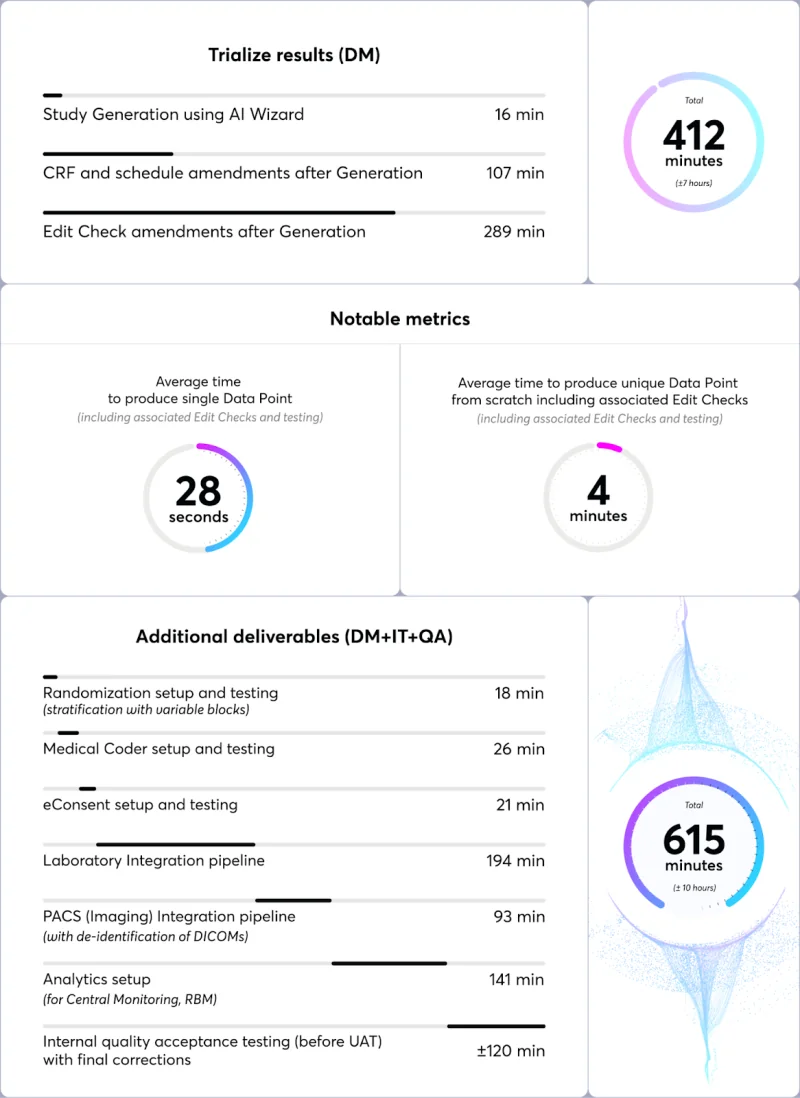Weekly Tech+Bio Highlights
Focus on AI platforms in drug discovery and biotech; mapping AI-driven candidates and targets.
Hi! I am Andrii Buvailo, and this is my weekly newsletter, ‘Where Tech Meets Bio,’ where I talk about technologies, breakthroughs, and great companies moving the biopharma industry forward.
If you've received it, then you either subscribed or someone forwarded it to you. If the latter is the case, subscribe by pressing this button:
In today’s newsletter:
Weekly tech+bio highlights;
Seed Health Invests in AI-Driven Biology Platform to Enhance Microbiome Science;
Novel Gen AI Platform for Preclinical Research;
-paywall-
This Company's ML Model Predicts KRAS Inhibitor's Clinical Benefit in Patients with >80% Accuracy (paid);
Model Medicines Advances AI Drug Discovery in Antiviral and Oncology Fields (paid);
A Novel Quantum-assisted Approach to Designing Drugs From Fragments (paid);
Cancer Vaccines: insights from #AACR24
Mapping AI-driven drug candidates and targets (infographic)
This week’s sponsor: Trialize
In the realm of clinical trials, efficient data management and monitoring are crucial yet often hampered by outdated and time-consuming practices.
Trialize's innovative approach to automating study builds and leveraging artificial intelligence (AI) for data analysis significantly reduced the time from protocol to trial, transforming the process from a traditionally months-long undertaking into a matter of days.
Trialize’s architecture offers a comprehensive, integrated solution covering all aspects of clinical trial management, from Electronic Data Capture (EDC) and Electronic Patient-Reported Outcomes (ePRO) to TeleVisits, eConsents, and Analytics. Its interface is designed to be intuitive and user-friendly, drastically reducing the learning curve for study teams.
Read Trialize’s case study Revolutionizing Clinical Trials: How AI and Automation Reduced Study Build Time from Months to Days, explaining the unique technical capacity of Trialize’s platform.
Now, let’s get to this week’s topics!
Weekly tech+bio highlights
💰 Vertex Pharmaceuticals acquires Alpine Immune Sciences for $4.9 billion, marking the largest biopharma acquisition of the year. This strategic move strengthens Vertex's position in immunology, with plans to further develop Alpine's lead asset, povetacicept, for IgA nephropathy and other autoimmune conditions.
🔬 Ginkgo Bioworks introduces Lab Data as a Service, offering rapid, scalable data generation for biotech R&D. With services like Enzyme Performance and Antibody Developability, customers can access extensive data in weeks, starting at prices like $78,000 for enzymes and $48,000 for antibodies, enhancing machine learning model training and design testing.
💰 e-therapeutics plans to delist from the London Stock Exchange and potentially relist on Nasdaq, following a £29m fundraise to invest in its AI-driven drug discovery platform. Despite strong backing from major shareholders, the UK investor response has been underwhelming, prompting the move to seek better valuation in the US market.
🔬 Ginkgo Bioworks and Novo Nordisk expand their strategic partnership, aiming to enhance the R&D and manufacturing processes for Novo Nordisk's chronic disease medications, including those for diabetes and obesity. The collaboration, set to last at least five years, will focus on leveraging Ginkgo's synthetic biology platform across the entire R&D pipeline.
🔬 Google and Bayer team up to develop AI-driven technologies for radiologists, integrating Google's cloud and AI capabilities with Bayer's expertise in radiology and clinical data. This collaboration will focus on creating a platform to ease radiologists' workloads and accelerate innovation in medical imaging, with plans for a first release in the EU and U.S. later this year.
🔬 Neurotech startup Neurovalens secures FDA clearance for a noninvasive anxiety treatment device, further expanding its portfolio which also includes an FDA-cleared device for insomnia.
💰 ADC-focused German biotech Tubulis secures an upsized $138 million Series B2 funding round, led by EQT Life Sciences and Nextech Invest. The funds will advance Tubulis' pipeline of antibody-drug conjugates targeting solid tumors and support the establishment of a U.S. subsidiary.
🚀NFX launches a $20 million ultra-fast investment track for Israeli AI and biotech startups, offering Seed and pre-Seed funds with a commitment to respond within nine days and transfer funds in three weeks, streamlining investment with SAFE agreements to reduce bureaucracy.
💰 Copenhagen-based startup Reshape Biotech secures $20M in Series A funding to expand its AI and robotics lab automation technologies to the US, enhancing R&D in biotech, agriculture, and food industries. Investors include Y Combinator and Astanor Ventures.
🔬 Children's Tumor Foundation invests in Healx to progress treatments for Neurofibromatosis Type 1, supporting the advancement of Healx's AI-powered drug discovery platform and lead compound, HLX-1502, into Phase 2 trials. This partnership emphasizes a patient-centric approach to address the significant unmet needs of the estimated 3 million global NF1 patients.
🔬 Charles River Laboratories and Deciphex launch Patholytix Foresight, an AI-powered decision support tool for toxicologic pathology, enhancing the efficiency and accuracy of histopathological assessments.
💰 DeepCure secures $24M in Series A-1 funding led by IAG Capital Partners to enhance its AI and automation capabilities in small molecule drug discovery, focusing on advancing its immunology and inflammation programs towards clinical trials
Seed Health Invests in AI-Driven Biology Platform to Enhance Microbiome Science
A 2015-founded life sciences startup, Seed Health has unveiled CODA, a new computational biology platform designed to leverage the expansive Human Phenotype Project data, managed by Professor Eran Segal at the Weizmann Institute of Science.
This initiative aims to foster the development of precision probiotics and other microbiome-directed interventions, enhancing the understanding of the intricate relationships between the microbiome and various health outcomes.
CODA will initially focus on advancing research in areas such as cardiometabolic health, brain health, menopause, and longevity.
The CODA platform integrates over three million phenotypic data points from more than 13,000 individuals, encompassing 40,000 cumulative subject years.
This robust dataset merges microbiome analysis with genetic, immune, metabolomic, and proteomic data, offering a holistic view of human health influences—biological, environmental, dietary, and lifestyle factors, along with medical histories.
This comprehensive approach aims to elucidate the complex interactions between the microbiome and host health.
The CODA platform's depth allows for the analysis of the microbiome’s interaction with various biological systems, such as the gut-brain and gut-heart axes.
Notable achievements include the development of organ-specific clocks that can differentiate between biological and chronological aging across different organs, highlighting the microbiome's potential as a target for health interventions.
Professor Segal’s research has been instrumental in identifying microbial genes and their network effects, which are critical for understanding health and disease mechanisms.
This research has led to discoveries such as the linkage between microbial genes and body composition, as well as the diet’s effect on metabolic parameters through microbiome modulation.
Novel Gen AI Platform for Preclinical Research
I’ve been following Toronto-based BenchSci for years, and I remember they started as an AI-search engine for finding reagents online with a focus on antibodies, including protocols for designing experiments.
And now, years later, the platform has kind of pivoted into a new realm: building a generative AI-powered drug discovery engine called Ascend.
Ascend utilizes multimodal AI to analyze and interpret complex biological data from public and private sources, including text and figures, with a focus on scientific accuracy and explainability.
By integrating and processing diverse datasets securely, Ascend supports preclinical R&D workflows, facilitating better experimental design, target identification, and drug discovery.




